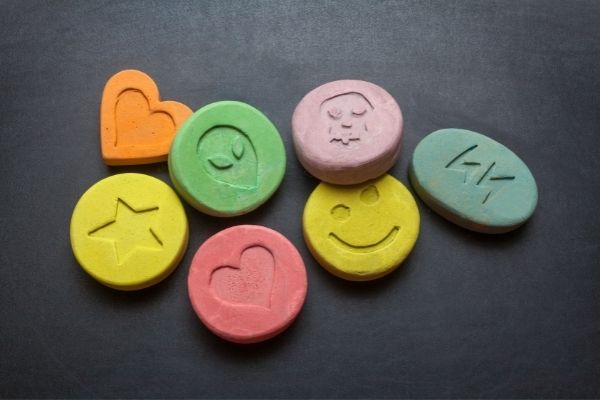MDMA, the popular club drug better known as ecstasy or ‘molly’, is a synthetic stimulant that causes euphoric rushes like amphetamines and psychedelic symptoms like hallucinogens. Widely used in party settings like raves, nightclubs, and music festivals, you wouldn’t have to look far before coming across the drug most often distributed in the form of colorful little pills or capsules. Despite there being all sorts of risks that can come from using this recreational drug (fatal hypertension, fainting, panic attacks, and seizures–not to mention the unpleasant come down), molly and ecstasy have reputations as being harmless. But, danger aside, is molly addictive as well?
How Addictive Is Molly?
There has yet to be a definitive consensus as to MDMA’s potential to get people hooked on it. Studies have found prolonged use can disturb serotonin and dopamine systems–the two neurotransmitters that play an integral role in the development of addiction. While MDMA is not nearly as addictive as drugs like heroin or cocaine, it absolutely has the possibility of being habit-forming, even if it is a few hairs shy of full-blown substance use disorder.
However, this doesn’t mean that molly gets off scot-free. Most molly isn’t pure MDMA. Nor is it a “more pure” form of the MDMA derivatives compared to ecstasy, despite popular belief. In many cases, the molly you’re being sold doesn’t contain a single bit of MDMA (a study found that 40% of what users believed to be molly didn’t test positive for any traces of the compound). Even in instances when MDMA is present, molly (and ecstasy as well) are often adulterated–diluted or ‘cut’ with other additives. These mimic the effects of MDMA and are virtually impossible to detect with the naked eye. The same goes for ecstasy, and both MDMA derivatives are equally at risk of being cut with more dangerous drugs.
If it’s not molly, what is it?
Common adulterators include dangerous compounds like bath salts, or other much harder drugs such as ketamine, cocaine, and meth. The addictiveness of these drugs is much less questionable. If molly is addictive, it largely is due to the presence of these dangerous substances as an additive. So what’s the takeaway from all this? If molly is the real deal, pure and unadulterated, it isn’t as addictive as other drugs. However, given the very likely circumstance that it’s a pill made of mystery substances and what you’re most likely to encounter at a party scene, then yes, you can get addicted to molly.
The Dangers of Using Molly
Don’t exhale a sigh of relief just yet. Just because (real) molly likely isn’t going to get you addicted on the first try, that’s not to say that it can’t happen at all. It also doesn’t mean you’re in the clear of avoiding unpleasant withdrawal symptoms or experiencing a potentially fatal overdose. Even before you get to this point, using molly can kill you. Here are a few physical side effects of using molly:
- Dehydration
- Electrolyte (sodium) imbalance
- Faintness
- Headache
- High blood pressure (hypertension)
- Hot flashes or chills
- Illogical or disorganized thoughts
- Involuntary jaw clenching and teeth grinding
- Kidney failure
- Lack of appetite
- Loss of consciousness
- Marked rise in body temperature (hyperthermia)
- Muscle or joint stiffness
- Nausea
- Panic attacks
- Restless legs
- Seizures
- Sweating
- Swelling of the brain
The conditions in which molly is often used significantly add to its dangers and can lead to several of the side effects listed above. Molly can lead to the body losing the ability to self-regulate its temperature. Consider a setting in which molly is often taken, a dance floor or other place crowded with dancing bodies. In this scenario, the results can send body temperature skyrocketing, a symptom known as hyperthermia. This can quickly lead to the shutdown and failure of the kidneys, rigid muscles or spasms, and rapid heartbeat that could result in heart failure.
Molly Overdose Symptoms
Many of the most dangerous symptoms of using molly are the ones that precede or are indicative of an overdose. These include:
- Confusion
- Dizziness
- Heart palpitations
- Muscle twitching or cramps
- Racing blood pressure
- Seizures
- Sharp rise in body temperature
- Vomiting
Long-Term Psychological Risks of Using Molly
Even if you’re fortunate enough to avoid all those, frankly, quite terrifying symptoms of using molly, you’ll still have the psychological consequences to deal with. The serotonin and dopamine pathways that enable molly to cause euphoric highs end up depleted after the drug’s effects have passed and a shortage ensues. This can lead to mood disturbances such as depression, anxiety, and paranoia. There are cognitive side effects too, such as poor memory and decreased ability to focus.
If you’re a molly user that’s having trouble trying to quit, find a Narcotics Anonymous meeting near you today.
Sources:
https://www.drugabuse.gov/publications/research-reports/mdma-ecstasy-abuse/mdma-addictive
https://nida.nih.gov/publications/research-reports/mdma-ecstasy-abuse/mdma-addictive

Trying to find a na meeting close to Manchester